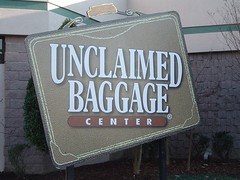 Image by sigmaration via FlickrEarnings from lost luggages!
-----
Image by sigmaration via FlickrEarnings from lost luggages!
-----
Welcome to the final resting place for luggage lost on
American airlines
Apr 16, 2011
ALONG a country road next to a muffler shop and a cemetery is a 40,000-sq-ft store filled with all the items that never made it home from vacation. Shoes, samurai swords,
iPods, even lingerie - all available for 20 to 80 per cent off.
More than 2 million of the roughly 700 million suitcases checked in on American airlines last year didn't arrive with their owners. The vast majority were returned within 24 hours, typically on the next flight. But 68,000 never made it.
After 90 days unsuccessfully trying to reunite passenger and parcel, most airlines sell the bags for a few bucks to the
Unclaimed Baggage Center, a warehouse-sized facility in Alabama that would put your local garage sale to shame.
Past an entranceway of world clocks and columns decorated with foreign currency, one traveller's misfortune turns into a bargain-hunter's paradise. Shoppers seem to have no qualms about buying what was once a child's favourite stuffed animal or a wedding dress that didn't get to the church on time.
"I feel sorry for the guy who lost it," said Chuck Trykoski, who bought a digital camera for US$21 (S$26.20). "I mean, I've lost stuff on the airlines, too."
Each day, the store sets out 7,000 new items, including sweaters, jeans, golf clubs, books and noise-cancelling headphones. And it's not just luggage. Plenty of belongings are left in seatback pockets.
Regulars line up each morning to get first crack at the goods. Others, like Trykoski, stop out of curiosity. Local and regional church groups come by the busload. Most people hear about the store through media reports and ads in the state's vacation guide.
It's "an adventure" for the 830,000 shoppers a year, said Bryan Owens, son of the founder who wears a Tag Heuer watch once found in a suitcase.
There have been some surprising discoveries over the years, including moose antlers, a parachute and a mediaeval suit of armour. Just don't come here expecting to find your lost luggage. Only a third of the items received make it to the racks. The rest are donated to charity or trashed. The store hopes to offer a small sliver of its ever-changing inventory online by the end of this year.
The airlines don't like to discuss how their customers' belongings end up here. American, Delta and United refused interviews. US Airways,
JetBlue and
AirTran acknowledged they sell items in bulk - sight unseen - to the store but wouldn't say how much they are paid, citing confidentiality clauses in their contracts.
"It's not something that we make money off," said Bill Race, who oversees luggage for JetBlue. "It's probably less than what you paid for lunch."
New York's Metro-North Railroad is paid US$25 for each suitcase-size box of lost property. Big-ticket goods such as electronics or jewellery are sold for 30 per cent of their value. Last year, Unclaimed Baggage paid Metro-North about US$38,000 for about 5,000 items.
Other airlines - Alaska, Frontier, Hawaiian, Southwest, Spirit and Virgin America - donate luggage to charities such as the Salvation Army.
Worldwide, almost 2.5 billion bags are checked each year, and 850,000 are never seen again by their owner, said
Nick Gates, who oversees baggage products for SITA, an aviation technology provider.
Airlines vary in their records for losing bags. Southwest says one of every 67,000 bags checked in is never reunited with its owner. Delta loses bags 13 times as often. Since the introduction of baggage fees, they're all doing better. The rate at which bags are delayed or mishandled is now half what it was in 2007.
Experts say the fees - airlines collect more than US$3.3 billion a year - deter passengers from checking in bags, easing strains on the system.
Bags that reach the Alabama store are opened and the contents are prepared for sale. Laptop and iPod memories are wiped clean and 40,000 pieces of clothing are laundered each month. Then the wet suits, rifles, coats, diamond earring and dresses are put out for shoppers.
While the store might be an addiction for some bargain-hunters, others come just for the kitsch factor.
After rummaging through the shelves, university students
Ryan Little and Jordan Haden walked out with a Will Smith CD, a Destiny's Child greatest hits album and a
Mary-Kate and Ashley Olsen hair-dryer. The total cost: US$13.76.
AP
Taken from TODAYOnline.com; source article is below:
Freshly tagged: Your lost luggage
 Image by Kaushal Karkhanis via Flickr
Image by Kaushal Karkhanis via Flickr

